Reporting and analysis by Robert Lynch; September 4, 2024
If Tompkins County’s legislative majority were driving down State Street, they’d dare not go one mile over the speed limit even were there no cop in sight.
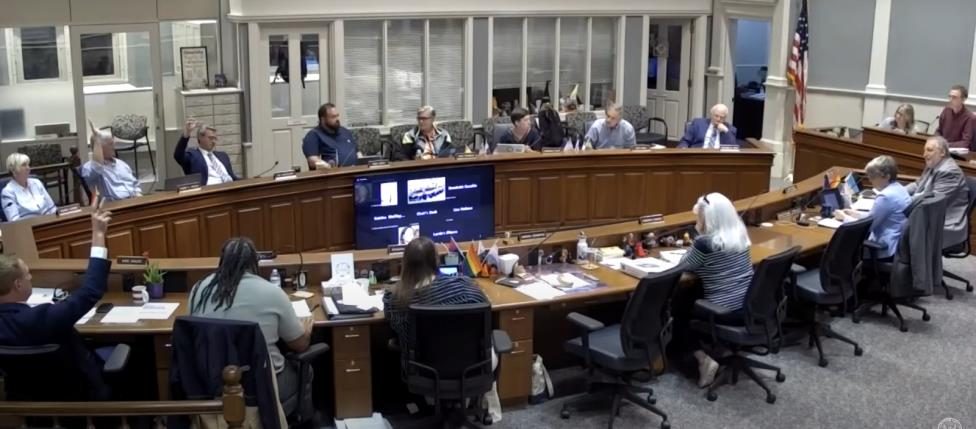
Legislators demonstrated their risk-aversion Tuesday night as most dared not stretch the rules to do what’s right and correct an administrative injustice that never should have occurred in the first place. It’s an injustice that’s imposed significant hardship on an Enfield community nonprofit.
By a ten-to-three vote, legislators rejected Randy Brown’s initiative that would have forgiven—or at least, attempted to forgive—more than $27,000 in property taxes and penalties assessed the non-profit Enfield Community Council (ECC) three years ago only because ECC had overlooked filing a simple exemption form by the state’s hard-and-fast deadline.
Intentionally or by happenstance, both fellow legislative Republicans supported Brown’s resolution. The ten Democrats who cast votes opposed it. (Democrat Amanda Champion recused herself.)
“Everybody seemed to drop the ball here,” Brown, southern Enfield’s representative, told fellow legislators. ”Because of simple paperwork, they were billed $27,000. It’s just not right.”
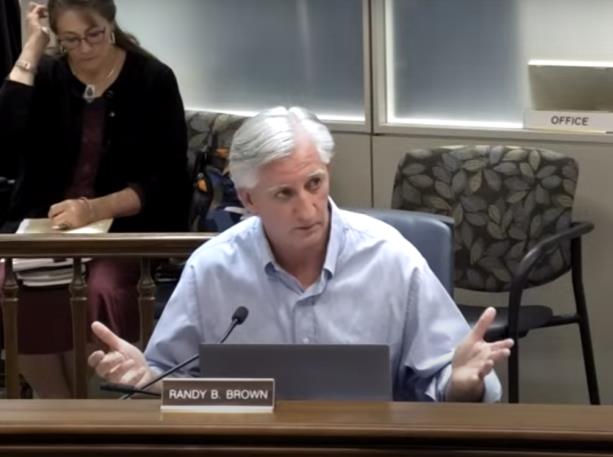
Not right, perhaps, but also an error tough to correct. While members offered plenty of sympathetic words for the ECC during a half-hour’s discussion of Brown’s tax forgiveness resolution, majority Democrats leaned heavily upon County Attorney Maury Josephson’s opinion that state law permits them no path to right this wrong and to offer a rebate.
“I don’t see at the moment a constitutional way to do this as laid out in the resolution,” Josephson advised lawmakers.
The ECC taxpaying mistake dates back to 2021. Enfield resident Helen Hetherington had reclaimed Enfield’s then seemingly-defunct Living Waters Church. Finding no other religious organization to buy it, Hetherington sold the building to the ECC. The church had been tax-exempt. ECC was tax-exempt. But Hetherington, herself, was not.
When the Community Council took title, it needed to file exemption paperwork annually with the Tompkins County Department of Assessment to reclaim its exemption. That first year—and only that first year—it missed the no-excuses, March first submission deadline. As a result, Tompkins County, the Town of Enfield, and the Ithaca City School District each imposed taxes on the building during their 2021-2022 billing cycles. ECC has tried, without success, to reclaim the paid taxes ever since.
Randy Brown first sought to refund the tax money last year, yet pulled his measure twice, and it never reached a vote. Tuesday’s retooled resolution would have returned to ECC $6,315 in interest and penalties the agency had paid. It would immediately return Tompkins County’s portion of the tax. And would “work to reimburse” the more than $16,000 paid to the Town of Enfield and the Ithaca City School District “as quickly as possible.”
“This is 30 per cent of their entire budget,” Brown said of the taxes ECC unnecessarily paid. “They’re in dire straits now financially to pay their bills and to do various things,” the legislator continued. “It’s a non-profit group, all volunteers. Enfield is the most economically-challenged town in the county.”
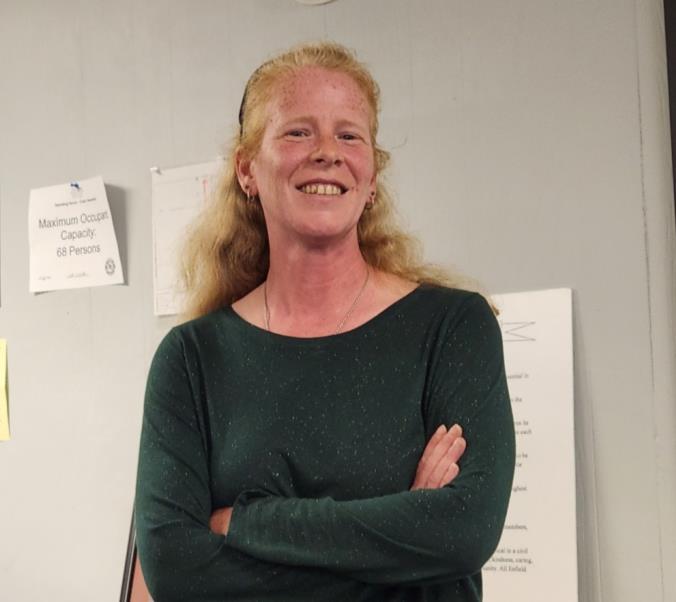
Brown, fellow legislator Anne Koreman, and this Councilperson-writer (who’d spoken on ECC’s behalf at the start of the meeting), read portions of a lengthy email ECC President Cortney Bailey had sent the Legislature over the weekend. Bailey detailed her agency’s tax problem, the Community Council’s history, its present efforts, and its fiscal plight.
“We desperately need whatever can be forgiven of the tax monies we paid,” Bailey wrote. “Our volunteers have been doing monthly dinners in the hopes of rebuilding our coffers, but it is not enough.”
To avoid massive, additional foreclosure penalties, ECC paid the taxes and interest last December. “Since paying the taxes, we have had issues with cash flow,” Bailey’s message continued. Indeed, it has. An unbalanced budget, approved by ECC’s Board of Directors in February, saw projected revenues falling nearly $12,000 short of expenses.
“This is a struggling outfit of volunteers that have been there for decades,” Brown said of the ECC. “So they did all the right things except they didn’t submit a form.”
But the law can be unforgiving. And for the Enfield Community Council, it appears to be just that.
“This is a tough one. The taxpayer is in a sympathetic position,” County Attorney Josephson acknowledged about the ECC. “On the other hand…” he cautioned, “The community center doesn’t have a claim of right to the money.”
Legislator Brown raised the question begging for an answer. What consequences would arise should Tompkins County simply bend the rules in ECC’s favor? What if it disregarded the letter of state law and relied instead on the law’s spirit?
“If we did provide these funds back, what happens to us?” Brown asked. “Do we get fined? Do we all get fired? What’s the penalty for doing this?”
“You don’t get fined. You don’t get fired,” Josephson replied. “You could end up with a finding that the Legislature as a whole has violated the New York State Constitution,” he counseled.
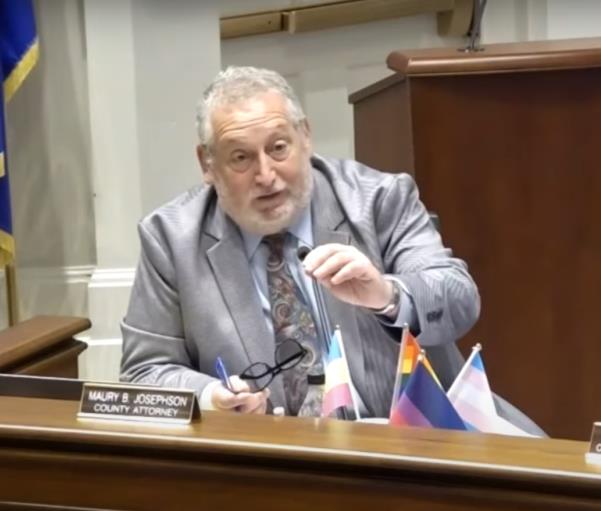
So, what would happen then? The attorney said litigants, although unlikely, could bring suit. “Is somebody going to litigate fast enough to try and obtain an injunction? Probably not,” he admitted. New York’s statute of limitations for municipal wrongdoing is short, and finding a plaintiff with legal standing to press a case could prove hard. Worst case, Josephson said, ECC could be asked to “disgorge the funds” returned to it.
“So they would end up in the same situation or potentially worse because they would have had the money back and may have spent it,” Josephson warned.
Yet, there’s the flip side to the argument. “You play litigation roulette,” the attorney acknowledged. “Maybe nothing happens.”
What’s more, the law in this area remains untested, he conceded. Case law addressing the constitutional argument is tough to find.
Nevertheless, most legislators—including Enfield’s other representative, Anne Koreman—proved to be gun-shy when it came to defying presumed legal authority. The majority became more than willing to let Josephson’s opinion stand as gospel.
“We all signed an oath when we took this office to uphold the constitutions of the United States and the State of New York,” Lansing’s Deborah Dawson stated in support of her refusal to give back the tax. “It would be a really ugly optic if we were to start making exceptions to when we were going to uphold that constitution and when we were going to decide not to.”
“And for that reason alone, I simply can’t vote for this; I’m sorry,” Dawson said.
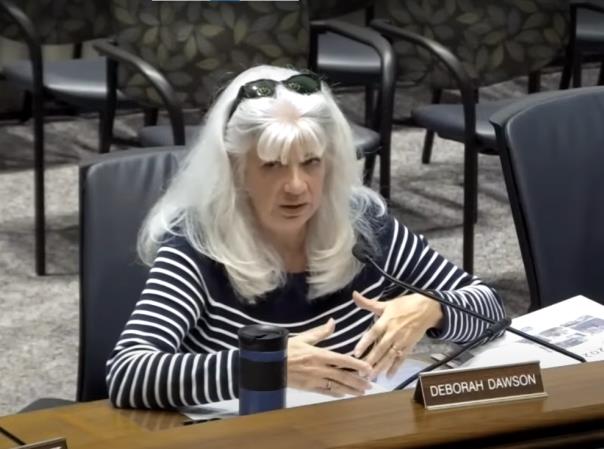
Dawson was not alone. Sorrow aplenty for ECC spread about legislative chambers Tuesday. And member Greg Mezey attempted what some may see as a face-saving gesture. He sought to “table indefinitely” any vote on Brown’s initiative. He’d have relegated it to parliamentary oblivion without anyone’s fingerprints of outright rejection being on it . Mezey’s attempt failed four votes to nine.
In the backs of many a legislative mind Tuesday may have been a recurring fear of setting bad precedent.
“If this taxpayer gets a break,” Josephson said, “how many other taxpayers come out and say I forgot this; I forgot that… Somebody comes in and says ‘I’m not paying the tax because I’m the best game in town, I’m good people.’”
Josephson’s opinions held persuasive power. But, still, timidity dissolved poorly when mixed with sympathetic gestures expressed on the legislative floor.
“I would love to figure out a way to help them moving forward,” Travis Brooks remarked, his words coming minutes before he voted against Brown’s resolution after earlier having seconded it.
“I hope there’s a way we can help them,” Mezey echoed. He also voted no.
“I do appreciate all the great things that are happening in Enfield,” former legislative chair Shawna Black remarked. “Cortney’s email was very compelling. And so if there was a way to vote for this and not to have to worry about us going against our oath, then I certainly would have done it, but I can’t support it now. I’m sorry, Randy.”
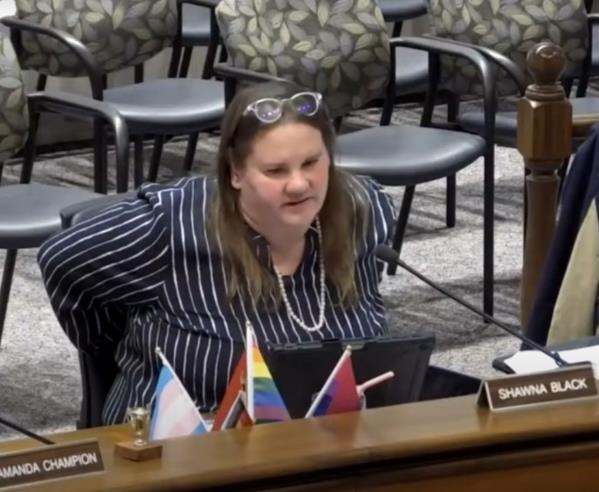
Black admitted she would have backed the ECC rebate earlier, but not after the attorney had given his opinion.
The current legislative chair, Dan Klein, weighed in near the discussion’s end; he, too, supportive of ECC, yet likewise refusing to endorse Brown’s initiative.
“What I will do,” Klein said, “is use the power of this microphone to amplify this message: Enfield Community Council needs a donation of approximately $28,000,” he said “If there’s an angel out there that can provide some or all of that, or more than one angel, your money will be put to good use.”
“That’s the best that I feel like we can do,” Klein said with regret. He, too, opposed granting ECC the rebate.
To us who watch from afar in Enfield’s hinterlands, Klein’s entreaty may tempt us to hurl forth words we’d later regret. The “angel” of whom the chairman now speaks can be found in the legislator’s own mirror. Dan Klein also chairs the Legislature’s Community Recovery Fund Advisory Committee. It’s the committee that not once, but twice has snubbed the Enfield Community Council’s appeals for support. And it’s the committee’s chair who has within recent weeks also voiced a clear preference for redirecting a potential last-minute, more than million-dollar windfall of recovery funds to buy dump trucks and bulldozers rather than to fund community agencies like the ECC, all for the sake of administrative expediency.
To some of us, the Legislature Chairman’s latest words ring hollow. Sorry, but they do.
For the record, Republicans Mike Sigler and Lee Shurtleff joined Randy Brown in walking out onto that legally-tenuous limb, taking a risk, and helping the Enfield Community Council pay its bills. We should remember them each. They, quite rightly, deserve to be called our friends.
###

